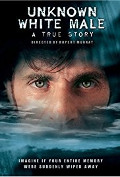
Directed by
Rupert Murray
88 minutes
Rated PG
Reviewed by
Sharon Hurst

Unknown White Male
Synopsis: Imagine waking up one day on a train to find you have lost all recollection of the previous 35 years of your life and no longer even have any idea who you are. This actually happened to Douglas Bruce. His friend Rupert Murray filmed the experience of Doug rediscovering his place in the world and forging a new identity.This documentary deals with a most interesting subject and in a way that makes us question some real fundamentals about who we are. Filmmaker Murray does this from the opening credits sequence, which is a collage of black and white snapshots, with a voice-over asking if you take away a person's memories, how much of that person is left.
Murray uses dramatic reconstruction to take us through Doug's first hours and days as he undergoes his terrifying ordeal. As the voice-over narrates, we share Doug's disorientation, cleverly portrayed with weird fish-eye lens camera work. Similarly, skilful camera work conveys the fear Doug feels, after turning himself into police, and being sent to hospital to undergo countless tests. Murray then cuts to interviews with psychiatric experts, who explain how it is possible to lose totally one's episodic memory (ie memory of individual life experiences) but to still function in terms of general knowledge, life skills etc. So, while Doug has totally lost his episodic memory, his procedural and semantic memory is preserved; he can still write, has general knowledge and so on. Almost as gripping as a thriller, we follow Doug's search as he discovers, through a phone number in his rucksack, who he is.
The extraordinary nature of this rare form of amnesia is driven home, as we see Doug having to meet afresh all the vital people in his life. He must be introduced to his father, sisters and friends (including the film's director). Doug's father is asked whether he recognises the "core" of Doug. In effect both are strangers to each other since there is no longer any relationship based on shared experiences. Doug's sister Marina says Doug has changed - he's lost some of his old spark, or edge, and yet he is more emotional and open.
One amazing scene has Doug visiting a room where his old belongings are stored. It's like a treasure trove of which he has no knowledge. Every meal he eats is like tasting it for the first time, and simple experiences like swimming in the sea are experienced with fresh eyes. In many ways he sees the world with the eyes of a baby and appreciates it with the mind of an adult. When visiting friends from London, where he had lived, he watches old home movies, seeing himself as a stranger, and the use of these films within the film is very poignant. Also included are some video diaries Doug began making of himself shortly after the memory loss.
This is a wonderfully thought-provoking documentary which both raises the crucial existential question of who are we without our memories and asks how we would behave if given another go at life? I eagerly await a follow-up, should Doug ever regain his old self!

Want more about this film?


Want something different?




